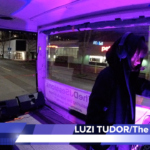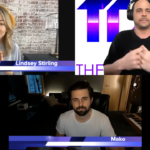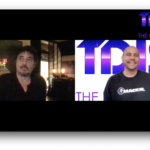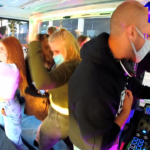909originals meets Ten City’s Marshall Jefferson and Byron Stingily – part one

If there’s one thing the world needs now, it’s positive vibes, so the re-emergence of pioneering house group Ten City comes at a propitious time.
Emerging out of the influential Chicago scene of the mid-80s, Ten City – originally comprising singer Byron Stingily, guitarist Herb Lawson, and keyboard player Byron Burke, under the aegis of producer extraordinaire and ‘silent partner’ Marshall Jefferson – struck big with 1987’s Devotion, following that up with a string of vocal house classics: Right Back To You, Suspicious, and the seminal That’s The Way Love Is, arguably one of the best house tracks of all time.
Ten City split up in 1996, with Stingily going on to enjoy solo success (not to mention taking up a position as a school principal) and Jefferson reaffirming his position as one of house music’s most influential producers.
Now, a quarter century on from their last output, and reformatted as a two-piece, Ten City are back, with Stingily and Jefferson releasing new single Be Free [available here] on Ultra Music at the end of January, and following that up with a reworking of That’s The Way Love Is [available here]… all of which whets the appetite for a forthcoming album, Judgement, which will be released in June.
909originals had the chance to catch up with Stingily and Jefferson, to discuss the Ten City legacy, the positive energy of house music, and what prompted their long-awaited return. Part two to follow next week.
Thanks for talking to us. Marshall I know you weren’t well recently – how are you feeling now?
Marshall: I was messed up. I had double pneumonia – that means both my lungs were filled with water. I don’t really know how I got it. It hit me for three months, and then right at the tail end of it I got food poisoning as well. I couldn’t even talk without coughing until about three weeks ago go, but I’m good to go now.
Ten City has an amazing legacy, it’s good news that you’re back because I think the world needs it at the moment – that sort of positivity that’s in the music and the lyrics. Before we get into the reasons why you’re back making music, obviously we’re still in this COVID maelstrom. How have things been for you both, mentally, financially..?
Marshall: I’m doing ok and, Byron is doing ok.
Byron: Mentally it has been hard, because with me in my day job as a principal, one of the things that I love to do is to build connections with students. Now when I go to work every day, everything is a virtual Zoom, and my students are in their homes. So that’s taken some adjusting to.
Also not being able to go out to restaurants and things that you took for granted – gatherings with family and friends. We humans are social creatures, and not being able to interact socially has been a bit of a strain.
Me and Marshall have been doing this a long time, so financially I’m doing ok. Whether I do a new record or I don’t do a new record, I’m ok financially on those terms.
That’s the beauty of doing this album. Sometimes with music you get so caught up in it and you’re doing it to make a living. With this album, neither one of us had to do it so we could make money from it. I feel that this album had a chance to come out of just joy. We’re doing it because it’s something that we love to do and not something we have to do.
We approached our first album [1989’s Foundation] like that – because it was fun and we were happy to be in the studio, creating something. This album had enabled us to get back to that.
Marshall: We’re just happy to be working with each other.
Would this album have happened if there wasn’t COVID? That now you have the headspace and the time to think about doing something like this? Or, is this something that was planned a while ago?
Marshall: I think it was coming anyway. It was December 2019 that we started talking about it.
Byron: We started talking about it in December, and then last March, the week before America went into lockdown, Patrick Moxey of Ultra flew to Chicago and met with me. He had already met with Marshall. Both he and David Waxman met with us about doing an album.
Then we went into COVID lockdown. But we had already began negotiations and talking about doing an album before COVID.
You had been working collaboratively on various things though, right?
Marshall: No. We always thought we were going to work on something, and we talked about it. I was overseas and Byron was in Chicago, and we just assumed that some day we would get together. And then decades went by…
Byron: We talk on the phone at least once a week. We talk about each other’s projects and things like that, and we crack jokes about each other.
Marshall: We talk about various things in life. We are in contact with each other constantly. You know how you think you’re eventually going to do something, but you never get around to it?
I can understand that, plus because you’re good friends, you want to keep business and your relationship separate, am I right?
Byron: It’s funny, because one of the first things when they came out here to meet with me in Chicago, they were like ‘we would like to do a Ten City album’ but they said there was one catch, ‘in order for us to do it, we want both yourself and Marshall to be involved. You don’t have a problem with that, do you?’
So I was like ‘hell yeah, I’ve got big problems with Marshall Jefferson!’ [laughs]. That was the catch, and I said ‘if that’s the only catch, then that’s fine’. We’ve talked about doing this for years and maybe it takes someone else to push it forward.
We always wanted to do it with the right platform, and when Ultra approached us, they could provide the right platform – they could get our music all over the world.
You can do a lot of things yourself nowadays, and I know a lot of people believe strongly in ‘do it yourself’, but we’re both so very busy at the moment, particularly with me being a school principal.
Before Ten City I did lots of promotions for various record labels, but I don’t have a lot of time to run around and do those kind of things, and neither does Marshall. So to have a label with a full staff that can give it the attention and promotion and get it into everyone’s hands, it provided the right platform to make us feel like our music will get a chance to reach people.
Was that the same for you Marshall – that they said you are going to have to work with Byron again if you’re going to make this work?
Marshall: I was happy they said that. Like I said, I had always assumed we would work together. I think both of us just looked up and realised it’s been two decades, what happened there?
I thought we were going to work on a bunch of stuff – not necessarily Ten City – but just write songs together. Like getting Lennon and McCartney back together.
Be Free came out a month or two ago. Was that almost like a tester to see how that would work before you did an album? That the idea was to release Be Free and then look at doing an album?
Byron: The album was finished before Be Free came out. Actually, that reminds me, when Ultra said to us that we had to work together, the other thing was that they wanted to include Devotion and That’s The Way Love Is on the album, and ‘you can do whatever else you want after that’.
That ‘you can do whatever else you want’ part felt really good.
Be Free was a good representation of the Ten City sound for 2021, with the live horns and live strings. We didn’t want the first thing we released to be a remix of one of our older tracks. Marshall had some great songs that in mind for Ten City, such as Come Together; I’ve been listening to it over the past ten days when I’ve been in my car.
There’s another song that CeCe Rogers worked on called Love Is Just A Game, I really love that. It’s reminiscent of Earth Wind and Fire doing house music, as somebody told us.
How long have you been sitting on these tracks, Marshall?
Marshall: Come Together is a couple of decades old. Love Is Just A Game was written last year.
Was there unfinished business when Ten City ended in the mid-90s; that it didn’t really end with the finale it should have? Is that another reason why you wanted to do it again?
Marshall: No, not really. It ended because we stopped working together, basically. I had things that I was doing and he had things he was doing. I actually recorded two albums that never came out, and Byron did what seems like a string of number ones. We just stopped working together, and now we’re working together again.
You mentioned about Be Free being the first single, rather than a big remake of That’s The Way Love Is or Devotion. When you are going back to those tracks, what are you changing on them? They are perfect house tracks, you don’t want to do too much to them when you’re updating them, right?
Byron: That was a fine balance. Initially I wanted to do something that was different from the original, and wanted to make the songs more ‘2020’. I wanted to make them more futuristic and bring different elements of today into it. Both the record company and Marshall said we have to stay close to the original blueprint.
But I was like ‘I don’t want to do exactly what we did back then, you still have the old version to listen to, so what’s the point?’
I did one version of Devotion that was a bit harder, and Marshall kept saying ‘let’s do it like the original’. When we submitted it to the record company, they said they wanted it as close to the original as possible, and they would get the remixes done. I was like, ‘oh boy’.
What they wanted to go for was something that would appeal to nostalgia, and those memories; also they wanted to have their own version of these songs. They were like ‘we’ll get the new young hot remixers to remix it, you guys leave that to us’. So that was sort of a compromise.
So there’s an updated version of the track out there that remains unreleased?
Byron: That’s correct.
Marshall: That’s the version with DJ Spen.
You talked about not working together for two decades but you know each other a lot longer; it’s probably closer to four decades now. Am I right in thinking it’s mid-80s when you first started working together?
Byron: Yes, it’s been four decades.
I read somewhere – I think it was in an interview that you gave, Byron – that when you first started working together, you weren’t too keen on each other’s music. Is that true?
Byron: No, that’s not true. I was a huge Marshall Jefferson fan at that time. I had three favourite house artists – one was Marshall Jefferson, then Larry Heard, and then it was a guy called Chip-E. Marshall loved my lyrics but didn’t like my music.
Marshall: It wasn’t your music, technically.
Ok, so you liked Marshall’s music, and Marshall liked your lyrics, so it was a case of ‘let’s do something here’?
Byron: Marshall is the one person who can do a house song from start to finish, and he doesn’t need anyone else. Marshall wrote, produced and arranged CeCe Rogers’ Someday – he wrote the melody and did all the music and played all the instruments. Marshall can do a song all by himself without me – I don’t want to come across like he ‘needs me’ to do his lyrics. He’s more than capable of writing great lyrics and great songs.
I think that together we really push each other. I’ve done some good songs – nothing like Move Your Body – but I’ve done some good songs on my own. I think that the two of us combined is a really good combination.
Marshall: I heard him sing on this record call Funny Love [by Dezz 7], and I thought his voice was nice, but the lyrics were sensational. When I started working with him, I think we had done a couple of sessions before we did the song I Can’t Stay Away.
That’s when the power came out. He brought out the diaphragm on that session. That’s when he started singing in the higher frequencies.
Byron, were you a trained singer at all back then, maybe you were singing in school or in church?
Byron: I played in bands all through my teenage years; new wave bands. I had the blonde mohawk hairdo and all that kind of stuff.
When you started working together, how did you decide that rather than just be a production duo you would form the group? Did the record deal come before the group was formed?
Marshall: Technically, the record deal came before the group. Byron came on tour with me on the East Coast and we did nine gigs in two days. Byron said to me, ‘hey, let’s stay the week and meet with some major labels’, and that’s what we did. We met with some major labels and got a record deal at the end of it.
I never would have done it, but Byron made the most of the opportunity. When we got the record deal with Atlantic, they said ‘give us something’… and we gave them something.
On the first album, Foundation, you have soul, disco, funk, electro – all these different combinations. Did Atlantic Records know what to do with you in terms of marketing, because you were different difficult to pigeonhole?
Marshall: They decided that they wouldn’t promote us. They wouldn’t spend any money on promotion and just make money off sales, since we sold without promotion.
Byron: It was different back then, because house was new. There were a couple of groups before us that had gotten deals – Jesse’s Gang had got a deal on Geffen, Bang Orchestra with Vince Lawrence had a deal on Geffen, and JM Silk had a deal on RCA.
Once they got out there and got their record deals, they all went in different directions and kind of went in more of a pop style. I think we were the first group that said that when we got a deal we were going to stay true to the Chicago house sound.
Marshall: It was mostly about staying true to the dancefloor.
Byron: We tried to stay true to the dancefloor. We were very appreciative of Atlantic – they signed us without even a demo. He really believed in us, and we got signed. This was a time that people weren’t signing house music groups, so Atlantic was at the cutting edge when it came to that. They looked at our music and realised that if they put out a song like Devotion, it could sell 80,000 to 100,000 copies without spending a whole heck of a lot.
We were young and didn’t really know the business, but they were gradually building us up. We got to a point where we had a Top 10 pop record with That’s The Way Love Is, and Devotion was a Top 20 pop record.
We would have liked to have been promoted to the same level that we saw other groups on the label being promoted. We felt at the time we were under promoted, but Top 10 in the pop charts is not too shabby. Top 40 pop records are not too bad for the label.
Marshall: We were appreciated, though. I think I was told that Atlantic had while we were there, the ‘black music’ department turned a profit for the first time since 1967.
We interviewed Steve ‘Silk’ Hurley a while ago, and one of the things that he mentioned was that when Jack Your Body really took off in the UK, with the whole acid house thing he didn’t really get the opportunity to capitalise on it. His label didn’t realise what was happening, and he had to fly over there on his own expense. Was that the same with you guys and That’s The Way Love Is, when it blew up in the UK? Did you know about it?
Byron: Because Steve ‘Silk’ Hurley’s record was Top 10 and also Farley Jackmaster Funk’s Love Can’t Turn Around, we knew that there was a market for Ten City.
I was begging Atlantic Records to give us money to go and do a promotional tour, but they told us it was not in the budget. Soon after that, grandmother called me on the phone… and told me to ‘go and get a razor blade’. I cut the hem on the curtain and $10,000 fell out!
We used that money to come over and stay in a hotel – the Columbia Hotel in Hyde Park – and we did our own promotional tour. As soon as it went Top 10, the record company called me and said ‘We did it! We brought it home.’
And you were like, ‘well you owe my grandmother $10,000?’
Byron: I did pay her back her $10,000, yes. The point is – we had to do a lot of things ourselves.
Thanks to Byron and Marshall for chatting to us. Part two to follow next week, and for those that are wondering, yes we WILL be releasing this interview in podcast format – stay tuned. Ten City’s Be Free can be purchased here, while That’s The Way Love Is can be purchased here.
[#item_full_content]



















Comments
This post currently has no comments.